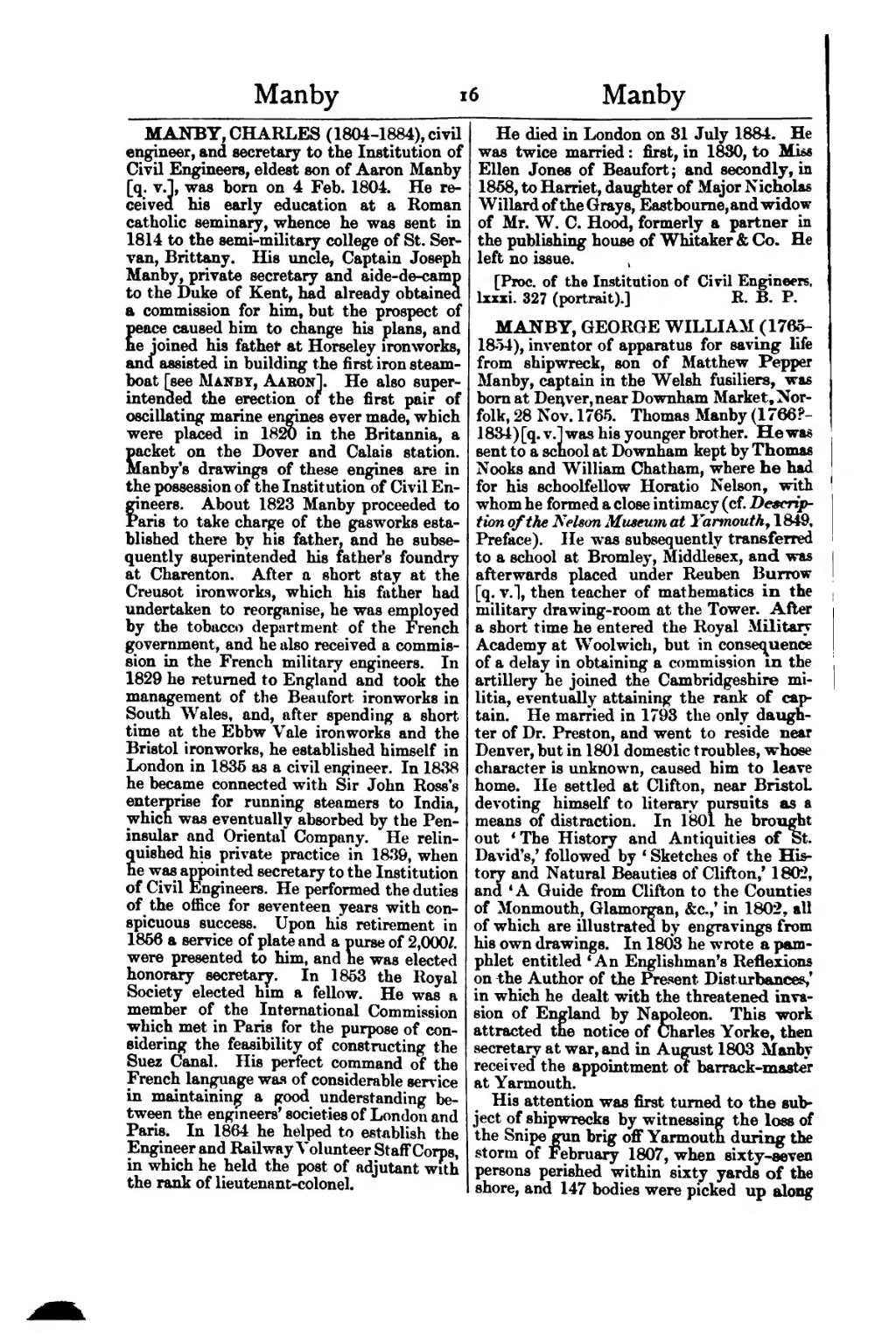MANBY, CHARLES (1804–1884), civil engineer, and secretary to the Institution of Civil Engineers, eldest son of Aaron Manby [q. v.], was born on 4 Feb. 1804. He received his early education at a Roman catholic seminary, whence he was sent in 1814 to the semi-military college of St. Servan, Brittany. His uncle, Captain Joseph Manby, private secretary and aide-de-camp to the Duke of Kent, had already obtained a commission for him, but the prospect of peace caused him to change his plans, and he joined his father at Horseley ironworks, and assisted in building the first iron steamboat [see Manby, Aaron]. He also superintended the erection of the first pair of oscillating marine engines ever made, which were placed in 1820 in the Britannia, a packet on the Dover and Calais station. Manby's drawings of these engines are in the possession of the Institution of Civil Engineers. About 1823 Manby proceeded to Paris to take charge of the gasworks established there by his father, and he subsequently superintended his father's foundry at Charenton. After a short stay at the Creusot ironworks, which his father had undertaken to reorganise, he was employed by the tobacco department of the French government, and he also received a commission in the French military engineers. In 1829 he returned to England and took the management of the Beaufort ironworks in South Wales, and, after spending a short time at the Ebbw Vale ironworks and the Bristol ironworks, he established himself in London in 1835 as a civil engineer. In 1838 he became connected with Sir John Ross's enterprise for running steamers to India, which was eventually absorbed by the Peninsular and Oriental Company. He relinquished his private practice in 1839, when he was appointed secretary to the Institution of Civil Engineers. He performed the duties of the office for seventeen years with conspicuous success. Upon his retirement in 1856 a service of plate and a purse of 2,000l. were presented to him, and he was elected honorary secretary. In 1853 the Royal Society elected him a fellow. He was a member of the International Commission which met in Paris for the purpose of considering the feasibility of constructing the Suez Canal. His perfect command of the French language was of considerable service in maintaining a good understanding between the engineers' societies of London and Paris. In 1864 he helped to establish the Engineer and Railway Volunteer Staff Corps, in which he held the post of adjutant with the rank of lieutenant-colonel.
He died in London on 31 July 1884. He was twice married: first, in 1830, to Miss Ellen Jones of Beaufort; and secondly, in 1858, to Harriet, daughter of Major Nicholas Willard of the Grays, Eastbourne, and widow of Mr. W. C. Hood, formerly a partner in the publishing house of Whitaker & Co. He left no issue.
[Proc. of the Institution of Civil Engineers, lxxxi. 327 (portrait).]
MANBY, GEORGE WILLIAM (1765–1854), inventor of apparatus for saving life from shipwreck, son of Matthew Pepper Manby, captain in the Welsh fusiliers, was born at Denver, near Downham Market, Norfolk, 28 Nov. 1765. Thomas Manby (1766?–1834) [q. v.] was his younger brother. He was sent to a school at Downham kept by Thomas Nooks and William Chatham, where he had for his schoolfellow Horatio Nelson, with whom he formed a close intimacy (cf. Description of the Nelson Museum at Yarmouth, 1849, Preface). He was subsequently transferred to a school at Bromley, Middlesex, and was afterwards placed under Reuben Burrow [q. v.], then teacher of mathematics in the military drawing-room at the Tower. After a short time he entered the Royal Military Academy at Woolwich, but in consequence of a delay in obtaining a commission in the artillery he joined the Cambridgeshire militia, eventually attaining the rank of captain. He married in 1793 the only daughter of Dr. Preston, and went to reside near Denver, but in 1801 domestic troubles, whose character is unknown, caused him to leave home. He settled at Clifton, near Bristol, devoting himself to literary pursuits as a means of distraction. In 1801 he brought out 'The History and Antiquities of St. David's,' followed by 'Sketches of the History and Natural Beauties of Clifton,' 1802, and 'A Guide from Clifton to the Counties of Monmouth, Glamorgan, &c.,' in 1802, all of which are illustrated by engravings from his own drawings. In 1803 he wrote a pamphlet entitled 'An Englishman's Reflexions on the Author of the Present Disturbances,' in which he dealt with the threatened invasion of England by Napoleon. This work attracted the notice of Charles Yorke, then secretary at war, and in August 1803 Manby received the appointment of barrack-master at Yarmouth.
His attention was first turned to the subject of shipwrecks by witnessing the loss of the Snipe gun brig off Yarmouth during the storm of February 1807, when sixty-seven persons perished within sixty yards of the shore, and 147 bodies were picked up along
